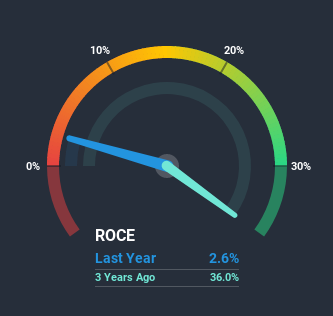- Hong Kong
- /
- Trade Distributors
- /
- SEHK:1891
Heng Hup Holdings (HKG:1891) Will Be Hoping To Turn Its Returns On Capital Around

If we want to find a potential multi-bagger, often there are underlying trends that can provide clues. Ideally, a business will show two trends; firstly a growing return on capital employed (ROCE) and secondly, an increasing amount of capital employed. This shows us that it's a compounding machine, able to continually reinvest its earnings back into the business and generate higher returns. Although, when we looked at Heng Hup Holdings (HKG:1891), it didn't seem to tick all of these boxes.
Return On Capital Employed (ROCE): What is it?
If you haven't worked with ROCE before, it measures the 'return' (pre-tax profit) a company generates from capital employed in its business. To calculate this metric for Heng Hup Holdings, this is the formula:
Return on Capital Employed = Earnings Before Interest and Tax (EBIT) ÷ (Total Assets - Current Liabilities)
0.026 = RM4.8m ÷ (RM206m - RM23m) (Based on the trailing twelve months to June 2020).
Therefore, Heng Hup Holdings has an ROCE of 2.6%. In absolute terms, that's a low return and it also under-performs the Trade Distributors industry average of 3.8%.
Check out our latest analysis for Heng Hup Holdings

While the past is not representative of the future, it can be helpful to know how a company has performed historically, which is why we have this chart above. If you want to delve into the historical earnings, revenue and cash flow of Heng Hup Holdings, check out these free graphs here.
What Can We Tell From Heng Hup Holdings' ROCE Trend?
When we looked at the ROCE trend at Heng Hup Holdings, we didn't gain much confidence. Around four years ago the returns on capital were 32%, but since then they've fallen to 2.6%. Given the business is employing more capital while revenue has slipped, this is a bit concerning. This could mean that the business is losing its competitive advantage or market share, because while more money is being put into ventures, it's actually producing a lower return - "less bang for their buck" per se.
On a side note, Heng Hup Holdings has done well to pay down its current liabilities to 11% of total assets. So we could link some of this to the decrease in ROCE. Effectively this means their suppliers or short-term creditors are funding less of the business, which reduces some elements of risk. Some would claim this reduces the business' efficiency at generating ROCE since it is now funding more of the operations with its own money.
The Bottom Line
From the above analysis, we find it rather worrisome that returns on capital and sales for Heng Hup Holdings have fallen, meanwhile the business is employing more capital than it was four years ago. But investors must be expecting an improvement of sorts because over the last yearthe stock has delivered a respectable 62% return. In any case, the current underlying trends don't bode well for long term performance so unless they reverse, we'd start looking elsewhere.
One more thing: We've identified 3 warning signs with Heng Hup Holdings (at least 1 which is concerning) , and understanding them would certainly be useful.
If you want to search for solid companies with great earnings, check out this free list of companies with good balance sheets and impressive returns on equity.
When trading Heng Hup Holdings or any other investment, use the platform considered by many to be the Professional's Gateway to the Worlds Market, Interactive Brokers. You get the lowest-cost* trading on stocks, options, futures, forex, bonds and funds worldwide from a single integrated account. Promoted
Valuation is complex, but we're here to simplify it.
Discover if Heng Hup Holdings might be undervalued or overvalued with our detailed analysis, featuring fair value estimates, potential risks, dividends, insider trades, and its financial condition.
Access Free AnalysisThis article by Simply Wall St is general in nature. It does not constitute a recommendation to buy or sell any stock, and does not take account of your objectives, or your financial situation. We aim to bring you long-term focused analysis driven by fundamental data. Note that our analysis may not factor in the latest price-sensitive company announcements or qualitative material. Simply Wall St has no position in any stocks mentioned.
*Interactive Brokers Rated Lowest Cost Broker by StockBrokers.com Annual Online Review 2020
Have feedback on this article? Concerned about the content? Get in touch with us directly. Alternatively, email editorial-team (at) simplywallst.com.
About SEHK:1891
Heng Hup Holdings
An investment holding company, engages in the trading of scrap ferrous metal in Malaysia.
Solid track record with adequate balance sheet.
Market Insights
Community Narratives



